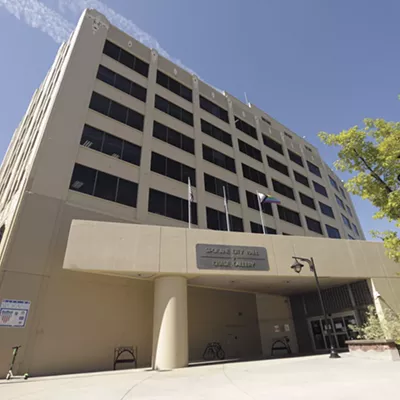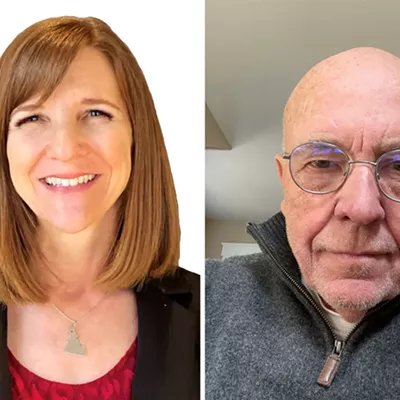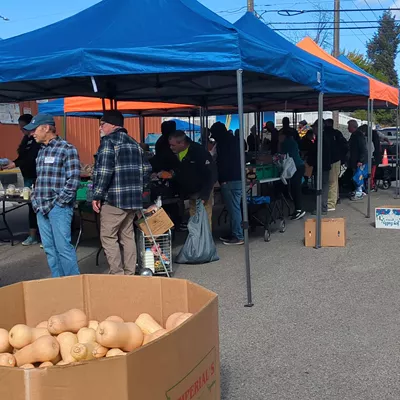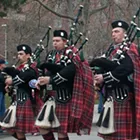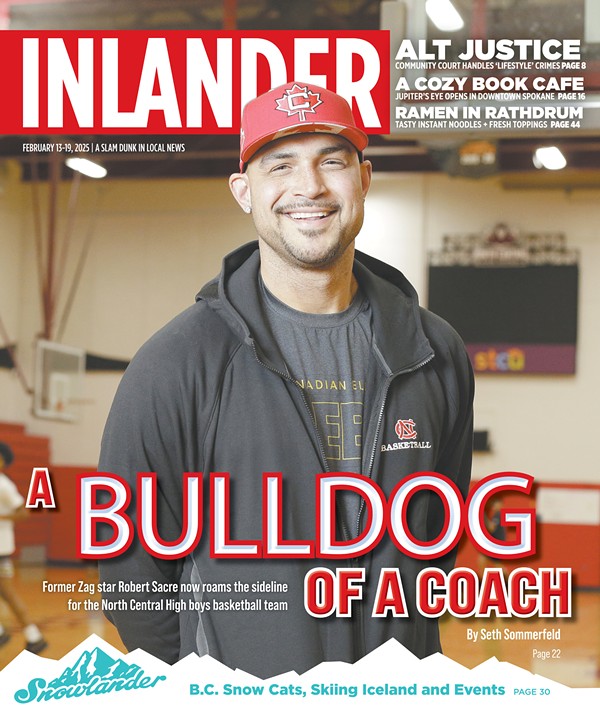Six people are running to represent northwest Spokane in this year's Aug. 1 primary election.
Almost all of the District 3 city council candidates agree that housing, homelessness and public safety are the biggest issues facing the city. But their backgrounds and plans for addressing the problems differ in significant ways.
They all say they'll work to set partisan politics aside and work with all sides of the aisle, but each comes with their own distinct political background: progressivism, environmentalism, libertarianism, conservatism and even a sort of new age mysticism.
Read on for a guide to this year's most crowded and ideologically diverse Spokane City Council race.
EARL MOORE
Earl Moore wants people to know that she's a big supporter of Spokane's police.
In early May, she showed that support by organizing a protest outside City Hall to oppose a city council resolution calling for an investigation into police Chief Craig Meidl's communications with downtown business owners.
Protestors waved signs that read "Support Spokane police" and "Investigate City Council." Mayor Nadine Woodward showed up and gave a short speech in support.
"Please, quit stalling and attacking our chief," Moore told council members at an open forum that night.
Moore is a precinct committee officer for the local GOP and a retired respiratory therapist. She's lived in Spokane for 45 years, and decided to run for office because she wants to be a "voice of reason" and make politics less divisive.
She's also a devout Christian, and says that if elected, she wants city council meetings to open with a prayer — Jewish, Christian or Muslim, it doesn't matter. She would also want to change the rule that limits open forum time to 15 public commenters.
"As elected officials working for the people that come, we should listen to everybody," Moore says.
Moore says she was glad to see a recent unanimous vote to approve the Police Guild's contract. When asked about the recent city council vote giving Spokane's police ombudsman authority to directly investigate the chief, Moore says she doesn't have enough information, but that she believes that council members need to let the mayor do her job.
Moore stresses her commitment to unity. As an example, she says she recently met with Council member Zack Zappone because she had concerns about the pride-themed crosswalks the city was painting in parts of the city.
But Moore says Zappone was able to answer her questions and reassure her.
"We had a good conversation," Moore says. "If the day comes when I can't sit down and talk and listen to anybody that I'm not in agreement with, that's very disappointing to me."
CHRIS SAVAGE
Chris Savage shows up to literally every single Monday night city council meeting.
Most candidates can't say the same. And if you want to fact check Savage's attendance record, you can go back through the archives and watch recordings of old meetings. He intentionally sits in the same spot on the right side of the council chambers — the part of the room that gets picked up on the City Cable 5 cameras.
"I want to make sure that people know that I'm not just talking a big game," Savage says. "I want people to see that there's actual evidence, because I think people need that consistency."
This is Savage's third time running for Spokane City Council. He ran for the District 3 seat currently occupied by Zappone in 2021 and got 4.3 percent of the vote in a crowded primary.
Savage says he's learned a lot from his past campaigns, and is feeling significantly more momentum this year. He says he's raised more than double what he did at this point in the race last time he ran. He's also earned endorsements from local GOP and former council members Mike Fagan and Bob Apple.
When he watches council meetings on Mondays, Savage says he generally finds himself agreeing with council members Michael Cathcart, Jonathan Bingle and very occasionally Karen Stratton.
Savage is the board chair of Meals on Wheels, and currently works as warehouse manager at Project Beauty Share, a nonprofit that provides makeup and hygiene projects to women and families in need.
KITTY KLITZKE
Kitty Klitzke was almost appointed to the District 3 council seat in 2014 after then-Council member Steve Salvatori resigned early. Stratton, who is stepping down after reaching her term limit this year, was appointed instead.
Klitzke has a long history working on local policy issues.
After working as an Army reserve medic, Klitzke spent 15 years with Futurewise, a nonprofit focused on preventing urban sprawl, and preserving farm and wildland. She's also been a board member for the Spokane Regional Transportation Council and the Spokane Regional Food Policy Council.
As a council member, one of Klitzke's biggest goals is to update the city's comprehensive plan, which charts out the city's long-term goals for growth.
"It decides your levels of service for police, fire, jail beds, intersection congestion, all of that stuff," Klitzke says. "It decides what our city looks like and how well it functions. And so for me, that's a super important thing."
Klitzke says she agrees with the spirit of the city council's recent pilot program allowing the construction of denser housing types, like fourplexes, citywide, but she also thinks the law came with unintended consequences.
She says some neighborhoods — mainly Indian Trail, Five Mile and Latah Valley — lack the transit networks and other infrastructure necessary for dense development. She wants to see more development on vacant lots in the city's urban core.
"Why are we building giant apartment complexes way out in these areas that aren't particularly safe to build on?" Klitzke says. "It only works when you have the infrastructure, otherwise it has serious impact. So while I agree with it in most of the city, those three areas are a big challenge."
Klitzke stresses that she isn't talking about the classic "neighborhood character" not-in-my-backyard argument against density.
"That's not what I'm talking about. I'm talking about clear infrastructure problems," Klitzke says.
ESTEBAN HEREVIA
Esteban Herevia describes himself as a mediator and strategic planner. Unlike most politicians, he has first-hand experience with housing insecurity, and is currently a renter.
"I don't have a place of privilege," Herevia says. "I don't come from a place of power. I truly am showing up because I care about how policy impacts each and every one of us."
Herevia currently works as a strategist for health justice and belonging at Washington State University's Elson S. Floyd College of Medicine. He also used to work as CEO of Spokane Pride.
"My bread and butter really is in transforming systems to ensure that all people are represented and that the systems actually work for folks," Herevia says.
Herevia's campaign has recently been shadowed by allegations that he engaged in an inappropriate relationship with a student while he was employed in a supervisory role at Whitworth University.
Chandler Wheeler, who outlined the allegations in a public Facebook post in May, does not say that any overt sexual contact happened between the two. But Wheeler does claim that Herevia abused his power as a mentor by fostering an intimate relationship with Wheeler while they were young and struggling with financial insecurity after coming out as trans to an unsupportive family.
Wheeler says the pair texted near-daily and regularly spent time together in private. Herevia invited Wheeler to stay on his couch after their family kicked them out. He also bought Wheeler alcohol when Wheeler was 19 and Herevia was 27. In hindsight, Wheeler describes a sea of red flags and alleges that Herevia was pursuing them romantically.
Herevia acknowledges that it was a mistake to buy Chandler alcohol and let them stay on his couch, but he denies having romantic intentions.
"I welcomed them into my life more like a sibling, or like close friends, and I recognize that doing so had consequences," Herevia says. "I want to assure folks that it has been time since then, I've actually had some really critical professional development since that relationship... I can assure you that it won't happen again."
Wheeler has called on Herevia to drop out of the race and release a public accountability statement. Herevia says he is currently working on a statement, but doesn't plan on dropping out.
"I've taken the time to consider and I've also sought out advice and it felt like it was still appropriate for me to run," Herevia says.
Herevia says he knows his opponents on the right may use the issue to attack him if he makes it through the primary.
"It would be a pretty typical attack response for somebody like me, an out gay man of color living in Spokane who's led a progressive organization," Herevia says. "They were going to attack me either way."
Herevia says WSU's investigation into the allegations is ongoing.
RANDY McGLENN
Randy McGlenn previously served as chair of Libertarian Party of Washington, and ran three unsuccessful campaigns against state Rep. Marcus Riccelli, D-Spokane, for a seat in the state Legislature.
He's now pivoting to city politics because he wants to be an advocate for neighborhoods and build up the neighborhood council program. He spent several years as chair of the East Central Neighborhood Council, and currently serves as community assembly representative for the West Central Neighborhood Council.
During that time, McGlenn says he grew frustrated by neighborhood councils losing some of their control over things like traffic calming funds and Community Development Block Grants. If elected, he says he will focus on empowering neighborhood councils and regularly attending meetings in his district.
"A lot of our neighbors feel like they say one thing and City Council does another, and that really hurts participation in our neighborhood council programs," McGlenn says.
On policing, McGlenn says he thinks it's possible to have accountability and an effective police department. He supports talk of strengthening the ombudsman's office, and also the recent ordinance giving police authority to arrest people in city parks after hours. He's on the fence about laws making public drug use a misdemeanor.
He doesn't believe in criminalizing drug use, but recognizes the quality of life issues and wants to give police tools for deterrence.
Like the other candidates, McGlenn says he's committed to being nonpartisan and working across the aisle. But he acknowledges that his background with the libertarian party does inform his beliefs. He sees libertarianism as combining the best of both worlds — a Democratic appreciation for civil rights and personal freedoms mixed with a Republican focus on financial sustainability and government constraint.
"I think being a libertarian, in this particular setting, really frees me to focus on issues from the very moderate perspective," McGlenn says. "I think we have a good meld of political philosophy that can really drive some effective solutions that will really build a broader consensus."
DARREN McCREA
Darren McCrea has a picture of Dr. Seuss's Lorax on his yard signs.
"I speak for the trees," he says. "What I'm trying to get people to see is that our trees are in peril."
McCrea is a member of the Colville Confederated Tribes and a long-time cannabis activist. In 2003, he opened SpoCannabis, the first medical marijuana dispensary in Eastern Washington. He says the plant has been crucial in helping with his medical issues, and he has spent years advocating for its legalization. He's currently advocating for legalizing psychedelic mushrooms.
McCrea hasn't raised any money, but says he's still confident in his candidacy because unlike the other candidates, he's solely focused on the existential threat of climate annihilation.
"We can't stop it, there's too much CO2 up there already," McCrea says. "So what we do is we try to mitigate the impact and we address food insecurities."
Towards the end of our interview, McCrea takes out a plastic box full of dried-out poop and sets it on his dining room table.
"I've got proof that Sasquatch is real right here," he says.
The preserved stool sample is roughly the size of a cantaloupe. McCrea found it about a year ago while walking near the Spokane River. He won't say exactly where, because he's worried about hunters showing up.
McCrea claims the undigested pieces of grass and a long, wiry red hair fragment are evidence of the creature's existence.
"Grab that part and hold that hair up to the light bulb," McCrea says. "There's nothing out in the woods that'll shit like that." ♦










